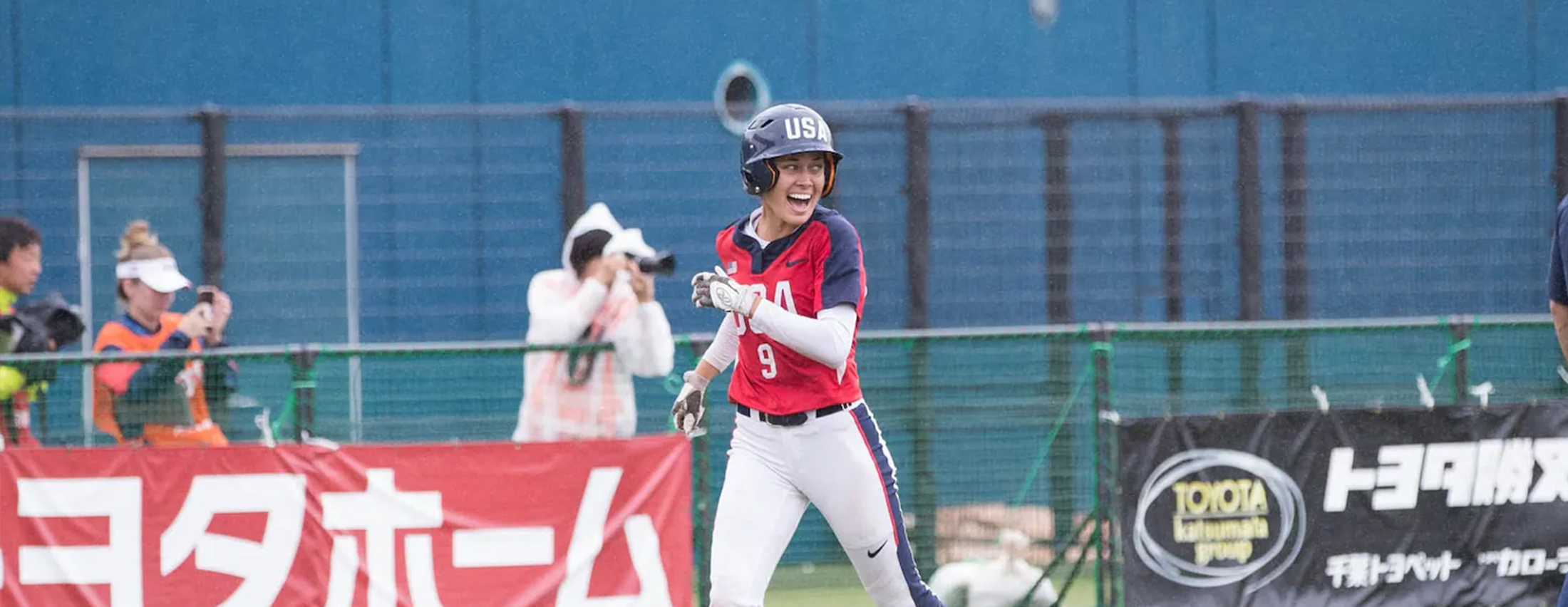Professional softball player, Janie Takeda Reed is a 3x All-American and US Olympian. As the youngest of three sisters, she grew up in Orange County, California, in a softball family. Janie is proudly half Japanese and the last “Takeda” in her family, hence why she changed her middle name to it. Janie attended the University of Oregon where she played in the Women’s College World Series three times and met her husband, professional baseball player Jake Reed. During her senior year, Janie received her first invitation to try out for the national team and went on to play in Tokyo at the 2020 Olympic games; taking home a silver medal as part of Team USA.
Photo credit: USA Softball
You are an inspiration and role model to many, especially other female athletes. What attributes make a good leader?
First off, thank you! Doing the work inwardly to be able to show up consistently for the people around you, being generous with your time and energy, and truly wanting the best for people. A good leader can’t be jealous, insecure, or trying to keep others down. A good leader champions other people, knows what they bring to the table, knows their limitations, and delegates to people around them knowing they need others just as much as others need them.
What advice would you give to younger female athletes?
Run your race well. There is room at the top for everyone! Comparing ourselves to other people will only lead us to be the second-best version of someone else. No one else can be the best Janie Reed. Only I can do that. Everyone’s race ends at a different place. Welcome that, and be willing to run hard until it’s over. Give everything you have, knowing ultimately you can’t always control the outcome, but you can walk away knowing you have no regrets. Most importantly, train your mind. Be disciplined and look inside so that being an athlete doesn’t ruin you. It will be difficult, and it will seem like it’s the most important thing in the world, but know who you are outside of sports! Sports are a wonderful thing, and we can enjoy them to the fullest when we know it’s not life or death.
Let’s talk about females in sports. As a professional athlete, what obstacles have you had to overcome?
How much time do you have? In all seriousness, this topic is vast and wide. There are logistical challenges and subjective challenges that I’ve had to overcome along with my peers being not only a professional female athlete but a professional softball player. Being married to a baseball player makes the comparison a little harder, sometimes knowing our treatment at the highest level of our sport is sometimes equivalent to a lower-level minor league baseball team. Our sport hasn’t been able to figure out how to translate the wild success of college softball into the professional realm. It’s hard for me, but it really breaks my heart to see such talented athletes have to retire prematurely because they can’t afford to play professional softball. There are no giant signing bonuses for the best of the best. Another challenge because of this is the length of the season. You spend 9-10 months training and only get to play for 2-3 months unless you get invited to be one of the “foreigners” in the Japanese professional league. And then there are smaller things like the treatment you face as a female athlete. People are asking what we’re going to do after the Olympics now that we have to get a “real job” as if what we have been doing for the last 7-10 years training for this goal wasn’t a legitimate job. It’s comments like this that make you wonder if male athletes ever get.
How are you breaking barriers faced by women in sports?
I serve on the Board of Directors for USA Softball as an athlete representative and view that as a way I have a seat at a very important table advocating for the athletes in the organization. I also am working with a group called RISR which is building an online app platform with hitting lessons and mental training lessons. For me, it’s the mental training lessons that really strike my fancy. I love the idea of getting to sit down virtually with some of these young athletes and give them the tools that have helped me and somewhat mentor them through the screen. The more we can pass down our knowledge to the younger ones, the more change can happen as they begin to be more equipped and educated and ready to come into their own with confidence.
What keeps you motivated?
What keeps me motivated has changed over the years. It used to be because I didn’t want to fail, but over time as I’ve grown, I’ve realized it is much more enjoyable to be motivated by the idea of greatness. And that takes me asking the question to myself of what I consider to be great. Greatness to me is investing in my physical, mental, and spiritual health and committing to the things that bring out the best in me. I’ve learned what those things are, and practicing these things on a consistent basis motivates me to continue to stay the course even when it gets tough.
Follow her journey:
Instagram | Like her Facebook page for updates on upcoming clinics & events
